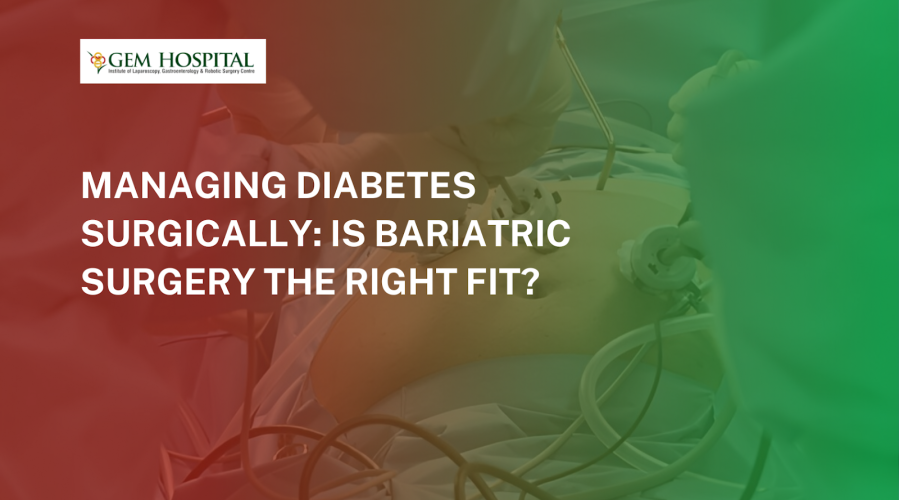Consult experienced hernia doctors in Chennai for expert surgical care. Advanced diagnosis, safe hernia surgery, and faster recovery with specialized treatment.
Managing Diabetes Surgically: Is Bariatric Surgery the Right Fit?

Diabetes, particularly type 2 diabetes, is an expanding global public health issue. It is impacting millions of people worldwide and is related to obesity, poor diet and inactivity. Lifestyle changes and medications are the first line of treatment, however, not all patients are able to achieve appropriate glycemic control. Some newer treatment options are aggressive, but effective, and one that is gaining traction for diabetes is bariatric surgery.
Understanding the Link Between Obesity and Diabetes
Obesity and insulin resistance have a strong association, with insulin resistance being a characteristic of type 2 diabetes. Excess fat in the body, especially visceral fat, creates metabolic disturbances that interfere with the body’s ability to manage blood sugar. When diet control, exercise, and medications do not achieve the desired results, bariatric surgery may be offered to help lose excess weight and reverse metabolic dysfunctions.
What is Bariatric Surgery?
Bariatric surgery includes a group of surgical procedures designed to help individuals lose weight by altering the digestive system. These procedures limit how much food the stomach can hold or how nutrients are absorbed, or both. The most commonly performed types include:
- Gastric Bypass (Roux-en-Y): Creates a small pouch from the stomach and connects it directly to the small intestine.
- Sleeve Gastrectomy: Removes a large portion of the stomach, leaving a banana-shaped “sleeve.”
- Adjustable Gastric Banding: Places a band around the upper part of the stomach to create a small pouch.
While initially developed to manage obesity, research over the past two decades has highlighted the surprising effectiveness of bariatric surgery for diabetes.
How Bariatric Surgery Helps Manage Diabetes
Patients with type 2 diabetes who undergo bariatric surgery often experience significant improvements or even complete remission of the condition. Here's how:
- Improved Insulin Sensitivity: Weight loss reduces inflammation and fat levels in the liver and pancreas, which in turn improves insulin function.
- Hormonal Regulation: The surgery alters gut hormones that influence appetite and glucose metabolism.
- Reduced Need for Medication: Many patients are able to reduce or eliminate the need for insulin and oral diabetes medications.
- Sustained Blood Sugar Control: Better glycemic control reduces the risk of diabetes-related complications like neuropathy, retinopathy, and kidney disease.
In fact, some patients report noticeable improvements in their blood sugar levels just days after surgery, even before significant weight loss occurs.
Is Bariatric Surgery for You?
While bariatric surgery for diabetes can be life-changing, it's not for everyone. Candidates typically include:
- Individuals with BMI ≥ 35 with type 2 diabetes
- Patients with BMI between 30–34.9 with poorly controlled diabetes despite optimal medical therapy
- Individuals who understand the risks and are committed to lifestyle changes post-surgery
Benefits of Bariatric Surgery for Diabetes
- Significant weight loss within months
- Lower blood sugar levels and potential diabetes remission
- Reduced risk of cardiovascular disease
- Decreased reliance on diabetes medications
- Improved quality of life and mental health
Considerations Before Opting for Surgery
Bariatric surgery is a major procedure and requires a multidisciplinary approach. Here’s what to consider:
- Pre-Surgical Evaluation: Includes assessment by an endocrinologist, surgeon, psychologist, and nutritionist.
- Nutritional Commitment: Post-surgery, patients must follow strict dietary guidelines and take supplements.
- Physical Activity: Exercise is crucial to maintain weight loss and metabolic benefits.
- Lifelong Monitoring: Regular follow-ups help detect nutritional deficiencies and prevent weight regain.
What Do the Experts Say?
Multiple clinical studies have shown bariatric surgery for diabetes is better than intensive medical therapy for glycemic control over the long term. For example, one study published in the New England Journal of Medicine found that nearly 60% of surgical patients achieved diabetes remission for up to five years, while only 5-10% on medication alone.
At GEM, our team of bariatric surgeons, endocrinologists and nutritionists join together to analyze your condition and determine the best surgical or nonsurgical approach for your diabetes management.
Bariatric surgery for diabetes is not a blanket approach; however, it can be a very powerful option for patients with type 2 diabetes who are a good fit for surgery. If you have been fighting for blood sugar control and struggling with your weight, now may be the time for consideration of a surgical option.
Schedule an appointment today with GEM Hospital where advanced surgical care meets compassionate healing.
Blogs & Article
Get advanced liver transplant treatment in Chennai with expert surgeons, modern technology, and comprehensive care for safe and successful outcomes.
Get advanced piles treatment in Erode with expert doctors. Safe procedures, modern technology, and effective care for fast relief and recovery.


